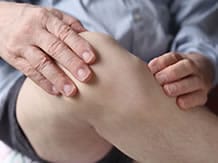Pain is the main symptom of osteoarthritis and is the main target of current treatments, medicated or not.
Why is osteoarthritis painful?

To feel the sensation of pain, our brain must be informed that "it hurts somewhere". This requires that messages from the nerve endings travel along the nerves that run through to the spinal cord and up to the brain.
However, cartilage is not innervated: it contains no nerve endings. Thus a priori, osteoarthritis, a cartilage disease, should not be painful ... and yet it is!
Two theories have been advanced to explain the pain of patients with osteoarthritis:
- pain comes from the suffering of adjacent tissues that are widely innervated, including the synovial membrane, the bone located below the cartilage and the ligaments and/or tendons;
- pain comes from the cartilage due to the appearance of nerve endings when the cartilage becomes diseased. The technical term is neo-neuro-genesis (genesis = manufacturing, neuro = nerve, neo = new).
How do you react to pain?
You carefully follow the treatment prescribed by your doctor
Well done, you are quite right to scrupulously observe your doctor's prescriptions. He or she alone knows which is the best treatment for you.
You do not take anything
You are wrong, osteoarthritis is by no means inevitable.
You take a tablet every now and then
You are right to want to ease your pain but why wait to suffer before taking medication?
If you follow your doctor's prescription to the letter, your flares could be less frequent and therefore pain would be less present.
You prefer to take medication for more important things
Of course, there are diseases more "serious" than osteoarthritis. But this is not a reason to neglect it because it can be a source of significant daily discomfort if you allow it to evolve without acting.
It's a real joint disease that requires effective treatment: medication, rehabilitation, local actions.
You take a drug recommended by your neighbour
Beware, only your doctor knows which drugs are suitable for you. Taking drugs from someone else on the pretext that it works for that person is not a good idea and can sometimes be dangerous. Follow your doctor's advice and, if necessary, talk to him or her about the product you have been recommended.
You stop the treatment after a few days because there is no improvement
Some drugs prescribed for osteoarthritis require taking for several weeks before you feel an improvement.
Be patient and trust your doctor, do not hesitate to tell him or her as they may be able to better adapt your treatment.
You stop the treatment as soon as you feel better
This is a mistake. You have to respect the length of the treatment as prescribed by your doctor. By interrupting an effective treatment without medical advice you risk compromising all the benefits obtained from it.
You systematically refuse corticosteroid injections
If properly carried out by an experienced physician, you should not be afraid of corticosteroid injections because they are very effective in cases of an osteoarthritis flare-up, especially in the knee.


















